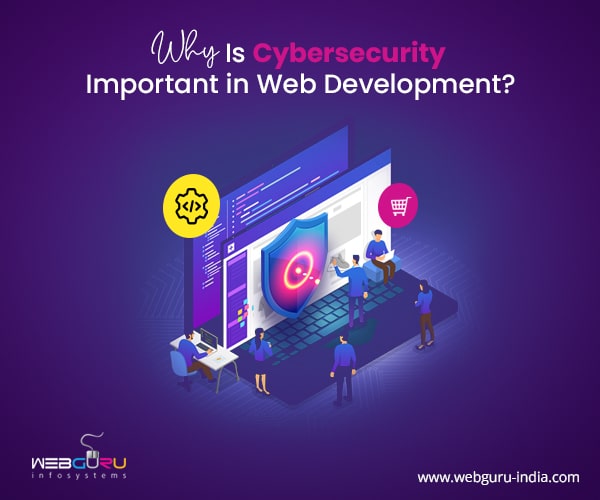Home Blog Website Development The Significance of Cybersecurity in Web Development
The Significance of Cybersecurity in Web Development
- 23 Nov / 2023
- 2,440 views
- 7 Min Read

The domain of web development has bloomed in a spectacular fashion with the improvement of technologies. The advent of sophisticated development languages and setups has contributed to enhancing the quality of websites and applications. Most emerging businesses now rely on skilled web developers to craft eye-catching and responsive solutions to meet their needs. However, one of the most ignored aspects of modern website development is cybersecurity. Developing any website now requires users to take security into consideration, as it has a direct impact on the user experience. Protecting confidential data that’s online and mitigating risks arising from any kind of vulnerability have to be prioritised.
Websites Can Either be Secure or Vulnerable
In the current digital era, web development is essential to our everyday existence. For banking, networking, shopping, and data access, end-users rely on websites and web-based apps. But there’s a cost to the ease of the digital age: the ongoing danger of cyberattacks. Varonis found that 94% of web apps contain at least one high-severity flaw, and 85% contain an XSS issue. It is also alarming that a lot of business websites are now being compromised due to cyberattacks. For this reason, cybersecurity in development is crucial. In this post, we’ll examine the importance of it and its role in protecting user information, companies, and the internet economy. Read on to gain valuable insight into how online users can be better protected by developers incorporating key cybersecurity-related actions.
Protecting User Data is Essential
Most websites offering access to services and products to consumers now handle high volumes of sensitive data related to their users. Protecting and keeping all this information secure is a key concern for businesses and their IT departments. Developers can integrate features that prevent the leakage of valuable data, such as the personal or financial details of their clients, customers, etc. Some of the methods to drive up security across online resources include encryption, authentication, and access control.
Data breaches can result in significant financial losses, damage to a company’s reputation, and potential legal consequences. Therefore, it is crucial for businesses to invest in robust cybersecurity measures and regularly update their security protocols to stay ahead of evolving threats. Additionally, educating employees about best practices for data protection and implementing strict data handling policies can further minimise the risk of data breaches.
– The potential consequences of data breaches
Data breaches can prove to be quite fatal for businesses with massive amounts of sensitive information on their servers. A situation like this might result in large financial losses, harm to the business’s brand, and legal repercussions. In addition to possible legal repercussions, data breaches may lead to a decline in consumer loyalty and confidence. A compromised website acts as an open portal for hackers to get and use private client data, including personal as well as financial data.
A 2020 Cloudwards analysis found that web application attacks cost $3.9 million and took 280 days to detect and control. Identity theft, fraud, and other cybercrimes may result from this, seriously harming the company’s image. Many businesses are suffering due to sudden data breaches, sensitive information theft, and other security issues. Thus, it is essential to put robust safety protocols in place and update them often in order to stop data breaches and safeguard the company’s clients as well as itself.
– Developers can implement some vital security measures for data protection
It is imperative that web developers become aware of the possible repercussions and incorporate the right steps to protect against breach attempts. Some of the most common steps include HTTPS (SSL/TLS) encryption, strong password requirement settings, and periodic security updates/patches. Additionally, developers need to incorporate cross-site scripting (XSS) protection, including anti-CSRF (cross-site request forgery) tokens, multi-factor authentication, security headers, and secure upload mechanisms. A new business or e-commerce website being developed should be compliant with widely-accepted data regulation standards such as HIPAA or GDPR.
The importance of checking all the boxes is paramount when it comes to ascertaining the security of any online asset, like a website or an application. What’s interesting is that new threats can always crop up and disrupt the privacy and functionality of any website without robust security measures in place. As a bespoke web development service provider, we place a strong focus on enabling our clients to grow their businesses without the hassle of handling data protection-related concerns. Our commitment to maintaining the security and privacy of client websites helps us propagate unmatched business continuity.
Safeguarding against Cyber Attacks
– Common cyber threats faced by websites
Websites are now often subjected to ransomware, DDoS, and phishing assaults, among other cyberthreats. Phishing attacks include deceiving people into divulging private information by using fraudulent emails or websites. The goal of a DDoS assault is to flood a website with too much traffic, making it crash or unusable. Attacks using ransomware encrypt data on websites and demand a fee to unlock it. These risks include a high risk of serious financial loss, harm to one’s reputation, and interruption of commercial activities. Malware infections, in which harmful software is inserted into a web page with the intent to steal confidential data or get unauthorised access, are another danger that a website may encounter. Hackers may also attack sites with the intention of manipulating or defacing the material, harming the site’s reputation and reliability.
– Incorporating security practices to prevent cyber attacks
Preventing cyber attacks on a website begins at the development stage, as there are certain measures developers can implement for ramping up the level of security. With the advancements of web development technologies, now it is possible to precisely safeguard different assets on one’s servers. The most commonly known methods, once again, are HTTPS encryption, multi-factor authentication (MFA), CSRF and XSS protection, input validation, security headers, and input validation implementation. Along with these, some other important requirements are secure session management, content security policy (CSP) headers for resource loading control, and rate limiting and throttling for brute-force attack protection. Developers may also have to facilitate regular secure backups, streamlined security patching, and dependency scanning based on their clients’ security and privacy requirements.
Maintaining Website Reputation with Requisite Cybersecurity Measures
– Security breaches can damage a website’s reputation
A fully-functional business website or e-commerce portal can come to a screeching halt due to a high-level breach or cyber attack. While the issue may be eventually fixed, the downtime that its potential (and existing) customers face can lead to the company’s loss of reputation. Hence, cybersecurity implementations cannot be taken lightly in any case. Loyal customers may instantly turn to competitors of a business because almost all of them are now spoiled for choice and have small attention spans. Therefore, developers and business owners need to work on implementing all required security features for preventing any unwanted scenarios.
– Importance of prioritising cybersecurity for website reputation
Cybersecurity (or the lack of it) has a direct impact on how useful a business and its website is to its potential leads. Even portfolio websites and blogs need to be secure to achieve and retain a positive reputation amongst visitors. As a result, companies offering web development services are increasingly focusing on integrating robust security measures into their websites. This includes implementing SSL certificates, regularly updating software and plugins, and conducting regular security audits to identify and address any vulnerabilities. By prioritising cybersecurity, businesses can not only protect sensitive customer data but also build trust with their audience, ultimately leading to increased conversions and a strong online presence.
– Legal implications of cybersecurity issues
Businesses stand to lose more than their good reputation and customer loyalty if they face data breaches or cyberattacks. This is because there are many laws and regulations for protecting the sensitive information of clients and customers. Failure to do so can lead to business owners and stakeholders facing legal consequences, along with several other repercussions. To be on the safe side, it is important to take all necessary steps in terms of development to prevent any security-related mishaps.
Conclusion
The information shared above highlights the importance and benefits of implementing cybersecurity in web development processes. Get in touch with us to know more about the scope of our custom website development services.

Saurav Majumdar
Saurav Majumdar is a curious mind with a never-ending quest for knowledge.
6 comments
Leave a Reply

-
1000+
Happy
Clients -
25+
Countries
Served -
19+
Years of
Trust







Informative Blog
Insightful read! Cybersecurity often takes a backseat in web development discussions, yet its significance can’t be overstated. Your breakdown of potential threats and preventive measures is comprehensive. I’d love to know, how do you see the future of cybersecurity evolving in the realm of web development? Keep these informative blogs coming; they’re invaluable for businesses navigating the digital landscape!
Appreciate this insightful discussion on cybersecurity in web development. It’s a critical element often overlooked, but your article brings it to the forefront.
Great post! Web security is so important these days. I didn’t know data breaches were that costly. Thanks for the info!
Great points altogether!
I found this blog very helpful and informative. keep uploading such blogs.